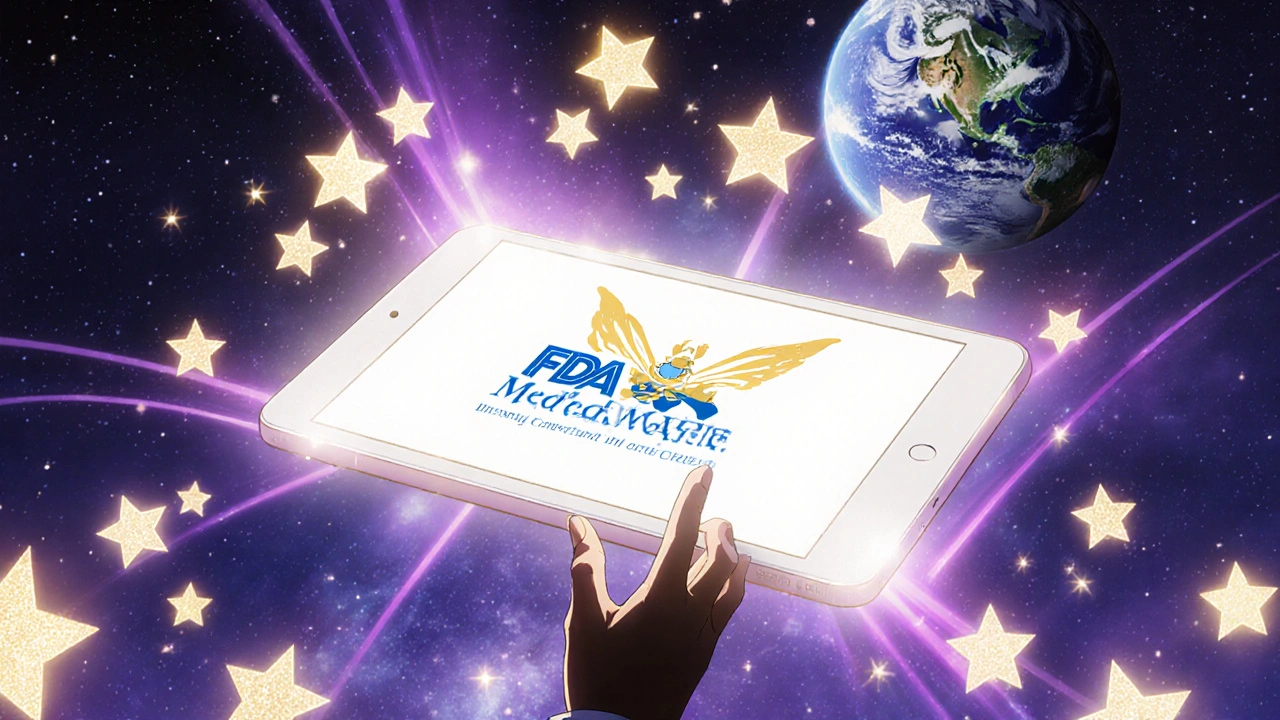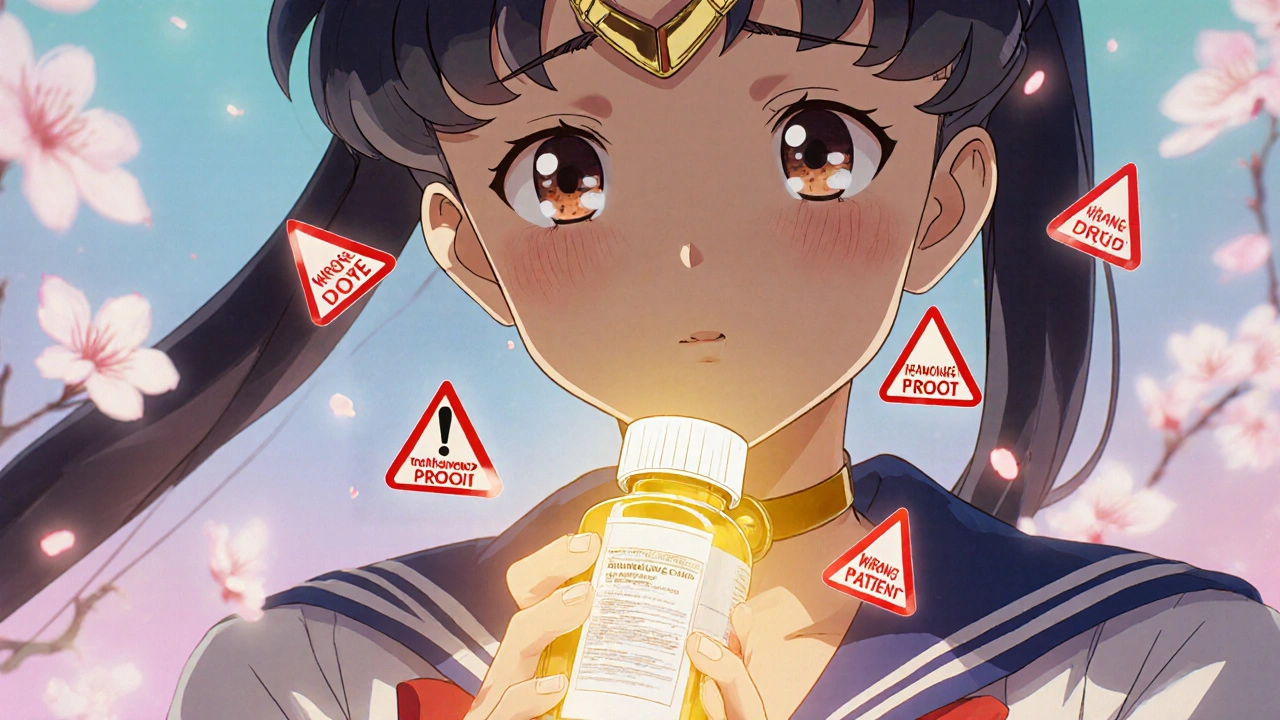When you take a medication, you expect it to help-not hurt. But mistakes happen. A pharmacist gives you the wrong dose. A nurse administers the wrong drug. Your doctor prescribes something that clashes with another medicine you’re on. These aren’t rare. In the U.S. alone, over 1.3 million people are injured each year because of medication errors, according to the Institute of Medicine. And many more go unreported. If you’ve noticed something off-whether it’s a strange side effect, a label that doesn’t match your prescription, or a pill that looks different-you have the right-and the power-to speak up. Reporting a medication error isn’t just about fixing your own situation. It’s about protecting others. Here’s how to do it the right way.
Recognize the Error First
Before you report anything, make sure it’s actually an error. Not every side effect is a mistake. Some medications cause dizziness, nausea, or fatigue as normal reactions. But an error happens when something goes wrong in the process: the wrong drug, wrong dose, wrong patient, wrong route (like a pill given as an injection), or wrong timing. Look for these red flags:- The pill looks different from your last refill-even if the name is the same.
- The instructions on the label don’t match what your doctor told you.
- You were given a medicine you don’t take, or one you’re allergic to.
- You start feeling worse shortly after taking it-rash, swelling, trouble breathing, confusion, or extreme drowsiness.
- You notice a mistake in your medical records, like a drug listed that was never prescribed.
Don’t ignore it. Even if you think it’s "probably nothing," document it. Take a photo of the medication bottle. Write down the date and time you took it. Note how you felt, and how long it lasted. This isn’t about blaming anyone-it’s about gathering facts.
Start with Your Provider
Your first stop should be the person or clinic that gave you the medication. Call your doctor’s office, pharmacy, or hospital unit. Don’t wait. If you’re having a serious reaction-like difficulty breathing or chest pain-go to the ER or call emergency services immediately. For less urgent concerns, say something like:"I received [medication name] on [date], but I noticed [specific issue]. I’m concerned this might be an error. Can we review my records and make sure this is correct?"
Be calm but firm. You’re not accusing anyone-you’re asking for clarity. Most providers will appreciate you catching it. But if they brush you off, don’t take it personally. Studies show 82% of patients who report medication errors feel dismissed at first. That doesn’t mean you’re wrong. It means you need to escalate.
Gather Your Evidence
To make your report stick, you need proof. This isn’t about being difficult-it’s about making sure your concern gets taken seriously. Collect:- The original medication container (keep the bottle-even if it’s empty).
- Photos of the label, pill, or packaging.
- Your prescription receipt or pharmacy printout.
- A symptom log: what you felt, when, and how long it lasted.
- Any written communication from your provider (emails, notes, appointment summaries).
Ask your provider for a copy of your full medical record. Under HIPAA, they’re required to give it to you within 30 days. If they delay, remind them: it’s your legal right. You’ll need this to prove what was prescribed versus what was given. In fact, 92% of successful error investigations depend on having this documentation.

Know Where to Report
You have several options. Each serves a different purpose.1. Internal Reporting (Through Your Provider)
Most hospitals and clinics have an internal safety reporting system. If you’re in a hospital, ask for the Patient Safety Officer. At a clinic, ask the office manager. This is the fastest way to get a local fix-like correcting a system glitch or retraining staff. But here’s the catch: many providers fear punishment if they report errors. That’s why only 14% of nurses report every mistake they see. Don’t wait for them to speak up. Be the one to trigger the system.2. Report to the FDA’s MedWatch Program
This is the national system for tracking dangerous medications and errors. It’s run by the Food and Drug Administration. You don’t need to be a doctor to use it. Anyone can file a report-patients, family members, caregivers. The FDA gets about 140,000 reports a year, but only 14% come from patients. That means your voice matters.The new MedWatch online form (updated in 2023) takes less than 10 minutes. You’ll need:
- The name of the medication (brand and generic).
- The dose and how you took it.
- Your symptoms and when they started.
- Your age, gender, and any allergies.
- Details of the error (wrong drug? wrong label? wrong dose?).
Submit your report through the FDA’s website. If you’re unsure, call 1-800-FDA-1088. The FDA uses these reports to spot patterns. One patient’s report about a mislabeled blood thinner led to a nationwide recall in 2023. Your report could save someone else’s life.
3. Report to the Institute for Safe Medication Practices (ISMP)
ISMP is a nonprofit that focuses on preventing medication errors. They accept anonymous reports and publish safety alerts based on what they learn. They processed over 12,500 reports in 2022-and 67% of those led to public safety warnings. Their system is non-punitive. You won’t be traced. You just help them improve systems.4. School or Long-Term Care Settings
If the error happened in a school, nursing home, or assisted living facility, report it to the facility’s administrator immediately. In 48 U.S. states, schools are legally required to document medication incidents within 24 hours. But only 32% of districts actually use those reports to make changes. Push for follow-up. Ask: "What are you doing to make sure this doesn’t happen again?" If you don’t get an answer, contact your state’s Department of Education or Health Services.What Happens After You Report?
Don’t expect a phone call the next day. Most systems move slowly. The FDA doesn’t always respond to individual reports. But that doesn’t mean nothing happened. Your report gets added to a database. If 10 other people report the same error with the same drug, the FDA will investigate. That’s how recalls happen.If you reported through your provider, you should get a follow-up within 7-10 days. If you don’t, call back. Ask: "Was my report reviewed? What changes are being made?" If they can’t answer, ask to speak to someone in quality improvement or risk management.
Some people worry reporting will make their provider angry. But research shows the opposite. A 2021 study found that when patients report errors calmly and with facts, providers are more likely to apologize, explain what went wrong, and fix the system. In fact, hospitals with open reporting cultures see up to 75% fewer repeat errors.

Common Challenges and How to Overcome Them
You might run into roadblocks. Here’s how to handle them:- "It’s not a big deal." Say: "It might not be a big deal for you, but it could be deadly for someone else. I’m reporting it because I care about safety."
- "We can’t give you records." Remind them: "Under HIPAA, I’m entitled to my medical records within 30 days. If I don’t get them, I’ll file a complaint with the Department of Health and Human Services."
- "You’re the only one who’s had this problem." You’re probably not. The FDA estimates less than 1% of serious errors are reported. Your report could be the first of many.
- "We’ll fix it internally." That’s good-but ask: "Will this be shared with the national system?" If not, file your own report with the FDA or ISMP.
Don’t let silence protect a broken system. The most dangerous errors are the ones nobody talks about.
Why This Matters Beyond You
Reporting a medication error isn’t just personal-it’s public health. Every report adds data to a national picture. When the FDA sees a pattern-say, a batch of pills with misprinted labels-they can pull the whole lot. When a hospital sees that nurses are misreading handwritten orders, they switch to electronic prescribing. When a school sees that aides are giving insulin without training, they mandate certification.Since 1991, ISMP’s reporting program has led to 217 safety improvements. The FDA’s modernized portal in 2023 already boosted consumer reports by 22%. That’s because people like you spoke up.
You’re not a troublemaker. You’re a safety partner. And your voice is the most powerful tool we have to stop these errors before they hurt someone else.
What if I’m not sure whether it was a medication error?
If you’re unsure, it’s still worth reporting. Many errors are subtle-like a wrong dose, a missed warning, or a drug interaction that wasn’t checked. You don’t need to be a medical expert to spot something off. If it felt wrong, if the label didn’t match what you expected, or if you had an unexpected reaction, report it. Experts say the safest approach is to report anything that seems unusual. You’re not responsible for proving it was an error-you’re just helping the system find it.
Can I report a medication error anonymously?
Yes, you can report anonymously to the Institute for Safe Medication Practices (ISMP) and to the FDA’s MedWatch program. You don’t have to give your name, phone number, or email. But if you want a response or to follow up on what happens next, providing contact info helps. Even if you report anonymously, your details still contribute to national safety data. Your identity stays protected.
Will reporting a medication error get me in trouble?
No. Reporting an error you experienced or witnessed does not put you at risk. In fact, healthcare providers are encouraged to welcome patient reports. The only time you might face issues is if you knowingly falsify a report. But if you’re honest about what you saw or felt, you’re doing the right thing. Many states have "apology laws" that protect providers who admit mistakes-and your report helps them improve.
How long does it take to hear back after reporting?
If you report to your provider, expect a response within 7-14 days. If you report to the FDA or ISMP, you likely won’t get a personal reply-because these are data collection systems, not customer service lines. But your report is logged and analyzed. If enough similar reports come in, the FDA may issue a safety alert or recall. You can check the FDA’s MedWatch website for public safety notices.
What if the provider refuses to acknowledge the error?
If your provider ignores your concern, escalate. Ask to speak with the office manager, risk officer, or patient advocate. If you’re still not heard, file a formal complaint with your state’s medical board or health department. You can also report to the FDA or ISMP directly. The system relies on patients to be the last line of defense. Your persistence matters.

Destiny Annamaria
November 20, 2025 AT 12:20OMG YES. I once got a pill that looked like a tiny rainbow and I thought I was hallucinating. Turned out the pharmacy swapped my blood pressure med for a diabetes one. I took a pic, called them, and they apologized like it was no big deal. But I filed a MedWatch report anyway. Someone else might get hurt if they don’t fix their labeling system. 🙌
Ron and Gill Day
November 20, 2025 AT 14:54This post is so painfully overexplained. Like, do people really need a 2000-word guide to not take the wrong pill? If you can’t read a label or remember your own meds, maybe you shouldn’t be managing them. Also, FDA reports? Please. They’re a black hole. I’ve filed three. Never heard back. Waste of time.
Alyssa Torres
November 21, 2025 AT 12:19Y’ALL. I just want to hug the person who wrote this. 🥹 I had a near-miss last year with a wrong antibiotic dose - my kid started breaking out in hives. I didn’t know what to do, but I kept the bottle, wrote down every symptom, and called the pharmacy at 11pm. They were shocked I caught it. I didn’t get a thank you. But I DID get a new protocol added to their system. This post? It’s the blueprint. Share it. Save a life. Seriously.
Summer Joy
November 23, 2025 AT 11:44Okay but like… why are we putting ALL the burden on patients? 😭 I mean, sure, I reported my error - but the pharmacist cried. The nurse got written up. My doctor looked at me like I was accusing him of murder. I didn’t even want to report it! But now I’m the "problem patient" and they won’t refill my scripts without a 3-page form. This isn’t empowerment - it’s emotional labor disguised as public safety. #MedicationTrauma
Aruna Urban Planner
November 24, 2025 AT 17:37From a systems perspective, the structural inertia in healthcare delivery mechanisms remains a critical bottleneck. While individual reporting is commendable, the absence of interoperable pharmacovigilance pipelines between primary care, pharmacy, and federal databases renders patient-initiated reports statistically negligible. The 14% reporting rate among clinicians is not apathy - it’s a symptom of institutional risk-aversion architecture. We need mandated real-time EHR flagging, not post-hoc patient advocacy.
Nicole Ziegler
November 26, 2025 AT 17:20just took my med and it looked different. i took a pic. called the pharmacy. they said "oh yeah we switched generics" and sent me a new bottle. no big deal. but i still filed the FDA thing bc why not. 🤷♀️💊
Bharat Alasandi
November 27, 2025 AT 07:10bro i reported a wrong dose last year and they gave me a free 3-month supply of meds as apology. honestly? the system works if you push. also, ISMP is legit. anonymous, fast, no drama. i did it on my phone during lunch. 5 mins. done. if you’re scared, just do it like this: "i saw something weird, here’s the bottle pic, let me know if you need more." boom. done.
Gerald Cheruiyot
November 29, 2025 AT 00:15Medication errors are a mirror of our fragmented care system. We treat health like a product line - pills stamped, labeled, shipped - without human oversight. The real failure isn’t the pharmacist’s mistake. It’s the design that lets mistakes happen at all. Reporting is a Band-Aid. What we need is systemic redesign. But until then… yes, take the photo. Call the office. File the form. You’re the only check left.
Michael Fessler
November 29, 2025 AT 02:11just wanted to say i used this guide when i found my insulin label had the wrong concentration. took a pic, called my dr, got a new script same day. but i also filed with medwatch. dont know if it helped anyone else but i felt better doing it. also… sorry for typos. typing on phone while holding my kid. 🤓
Katie Magnus
November 29, 2025 AT 03:47Wow. So now we’re all supposed to be amateur pharmacists and data entry clerks? What’s next? Patients doing the doctors’ charting? This is just another way to make people feel guilty for being sick. I’m not reporting anything. I’m just taking my meds and hoping for the best. If you want to be a hero, go ahead. I’ll be here, alive and not filing forms.